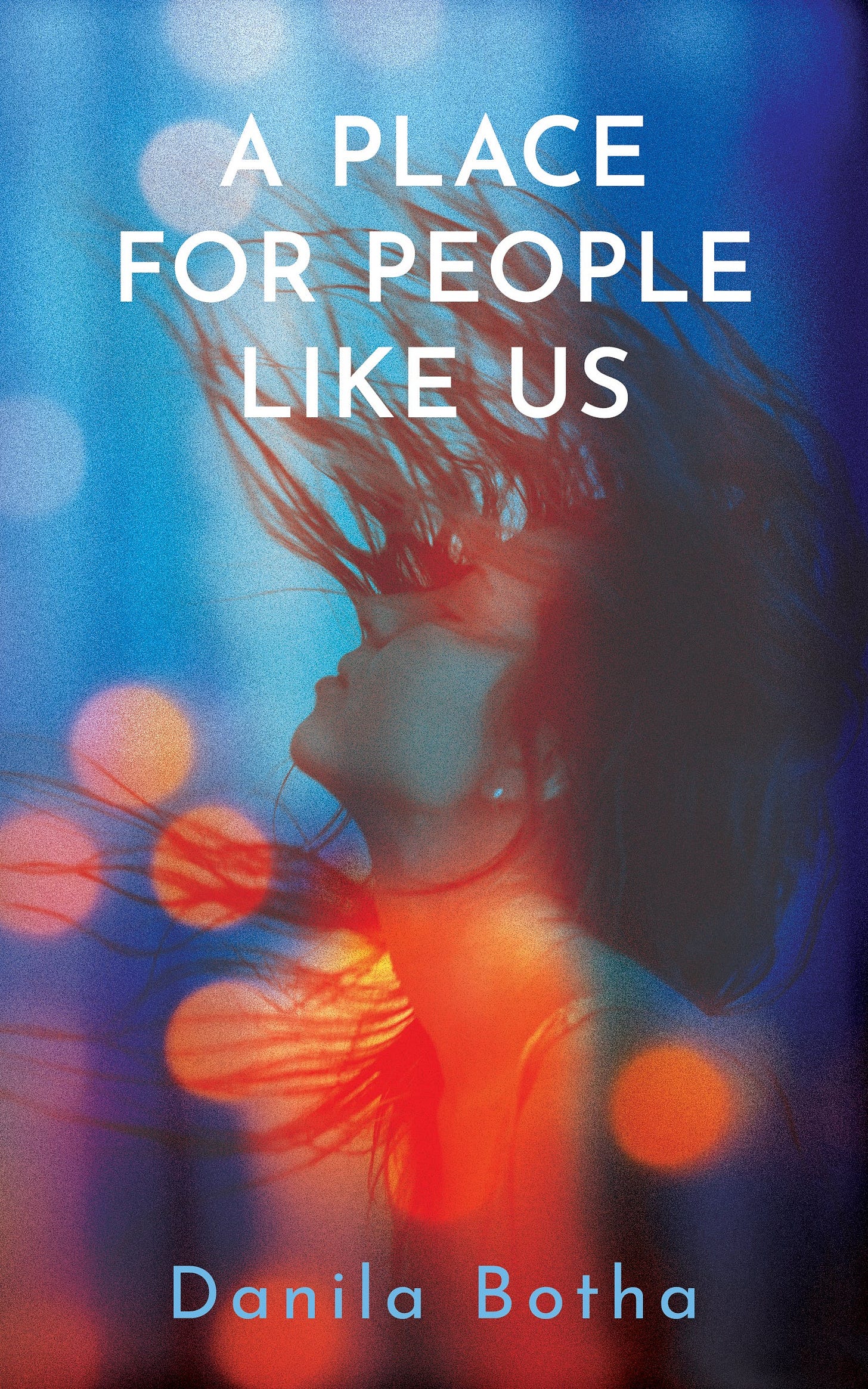A Place For People Like Us by Danila Botha
Reviewed by Aviva Rubin
A Place for People Like Us follows Hannah, a traumatized young woman trying to build a responsible life out of the wreckage of her childhood in a cult led by her polygamous, pedophile father— a man she has testified against, wants no contact with, yet still occasionally craves love and affirmation from, having been conditioned to need it.
“Intimate, fast-paced, and full of complex, sympathetic, flawed, not-who-they-seem-to-be characters.”
Newly clean and sober, now enrolled in an elite business program in Toronto, Hannah constantly fights the instinct to blow things up. Author Danila Botha lovingly draws a complex and often contradictory portrait of Hannah— as she sees herself: bland and unremarkable; and as others see her: smart, talented and beautiful.
Vulnerable to the draw of bright, shiny things, Hannah lets the striking, charismatic, unstable singer Jillian, a Sephardic Jew from a religious family, pull her quickly into her orbit. Within days, Hannah is invited to live in the bohemian apartment that her new friend describes as “a place for people like us”— outsiders. That kind of belonging is seductive. The fact that the two become lovers remains secondary to the hold Jillian has on Hannah.
A foil to the wild, erratic Jillian, is the hard-working and stable Mark/Naftali, whom Hannah starts to date. A smartly dressed modern orthodox Jew with blond hair and blue eyes, Naftali comes from a wealthy and important family, steeped in its own shameful secrets. Almost more than she is charmed by her kind, decent boyfriend, Hannah is captivated by the rule-bound, foreign yet oddly familiar world he inhabits. It turns out that Hannah’s father is also Jewish— learned though not practicing, his own parents Holocaust survivors. What, Hannah wonders, has she been missing?
Judaism quickly becomes a quirky central character in the novel. In one funny scene, Naftali describes the interaction between young Orthodox men and women first meeting through a matchmaker in public places like hotel lobbies: “It’s like two bad actors reading from the world’s most boring script.”
In what feels like far too short a time, Hannah is on the path to an Orthodox conversion, where she and the reader are immersed in a comforting, opulent, but often twisted world of ritual, order, modesty, and rigidity. Everyone has strong opinions about how she must behave in order to belong. Parallel to this is her craving for Jillian’s life of music, art, drugs, tattoos, and volatility.
Even in a circumscribed world unto itself, Hannah cannot escape her father’s grip. On a trip to Israel, while in the Old City in Jerusalem, she passes a man singing to his twins in a stroller: “Hamalach hagoel oti mikol rah. I felt like I was dreaming. My dad had sung it to me when I was sick when I was little. I had a fever that wouldn’t break, it was over a hundred, and my mom was angry that he wouldn’t get me Tylenol or Advil, but I loved the song.” Despite the nightmare he served up, Hannah sometimes clings to the comforting bits her father offered.
Throughout A Place for People Like Us, Botha teases both Hannah and the reader with the promise of stability and escape from trauma into a life of comfort, ritual, and clarity. Hannah alternately rejects and returns to the so-called wisdom of a dominant father, the pull of a manipulative friend, and the walls of an Orthodox Jewish world. In her desperate search for trust and love, Hannah’s choices are dizzying moving targets.
Intimate, fast-paced, and full of complex, sympathetic, flawed, not-who-they-seem-to-be characters, A Place for People Like Us catapults the reader from a hip downtown world to a north Toronto Orthodox enclave, to Jerusalem and Tel Aviv. Both a love letter to Judaism and a warning about the cult-like trappings that all forms of insularity can take, the novel moves towards an unexpected and shocking ending.
Full disclosure: this is a world that the reviewer knows quite well. So the language and rituals— many focussed on separation— don’t seem as curiously foreign as they might to others.
About the Author
Danila Botha is the author of three critically acclaimed short story collections, GOT NO SECRETS and FOR ALL THE MEN (AND SOME OF THE WOMEN I’VE KNOWN) which was a finalist for the Trillium Book Award, The Vine Awards and the ReLit Award. Her collection, THINGS THAT CAUSE INAPPROPRIATE HAPPINESS was published in 2024 by Guernica Editions. She is part of the faculty at Humber School for writers and is currently working on a new short story collection.
About the Reviewer
Aviva Rubin is a Toronto-based writer of memoir, essays, social commentary and fiction. Her writing has been featured in numerous anthologies, The New York Times, The Globe and Mail, The Toronto Star, Chatelaine, Toronto Life, Zoomer, Huffington Post, and Reader’s Digest amongst others. She is the author of the memoir, Lost and Found in Lymphomaland –– a harrowing and funny trip through a cancer diagnosis and treatment. WHITE, her debut novel, is the story of a young woman who grows up in a white supremacist family, rejects those views, then seeks to take down the movement from within — with dire consequences.
Book Details
Guernica Editions (Essential Prose)
978-1-77183-980-8
229 pages | September 29, 2025





